#minoru kawasaki
Photo

The Calamari Wrestler
417 notes
·
View notes
Text




Terrestrial Defense Girl Iko-Chan and it's sequels are early works of Minoru Kawasaki, director of such films as; The Calamari Wrestler, Executive Koala, The World Sinks Except for Japan and Monster Seafood Wars.
143 notes
·
View notes
Text
Chikyuu Bouei Shoujo Iko-chan
One of the interesting side effects of defining this blog's scope in the way that I have is that, for better or for worse, only focusing on magical girl manga that don't have anime adaptations automatically filters out almost every multimedia franchise. Sure we've talked about a couple manga adaptations of big live action productions, but there's a difference between that and a series that spreads itself across a handful of mediums simultaneously. Most magical girl multimedia projects from Japan will throw an anime of some form into the mix. Which is to say most, but not all. Today we'll be taking a look at a series which, throughout the late 80s and early 90s, released manga, a video game, a live action series, and more, but has no anime.
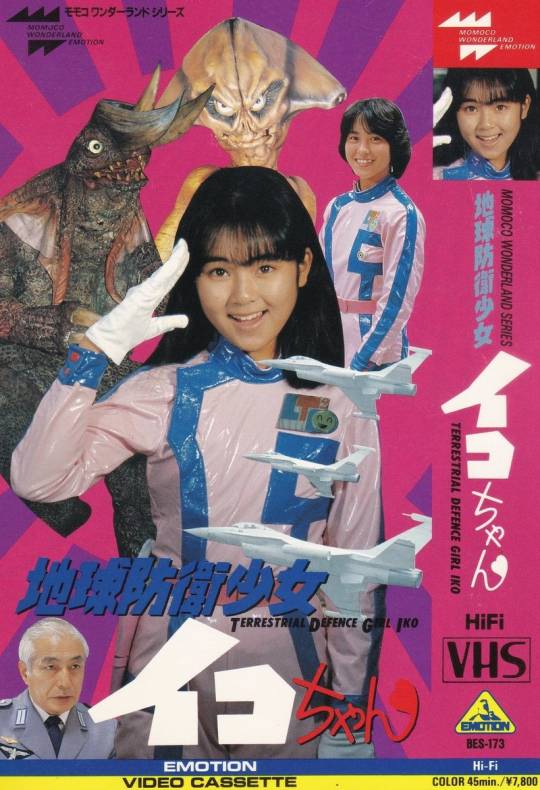
Chikyuu Bouei Shoujo Iko-chan (Terrestrial Defense Girl Iko) started as a live action direct-to-video series in 1987. The protagonist is Iko Kawai, a middle schooler who one day helps a member of the intergalactic police she sees lying unconscious on the pavement, and as a reward she is gifted a high tech headset called the Super Incom. The Super Incom allows her to use ESP to do what she believes is right, giving her abilities including but not limited to instant outfit changes, teleportation, leaping tall buildings in a single bound, shrinking, and communicating with beasts. In using her newfound powers, she catches the attention of an Earth defense squad known as the Light Terrestrial Defense Team, LTDT for short. They recruit Iko as a new member, and now armed with her Super Incom and gadgets from the LTDT, it is her duty to protect Earth from extraterrestrial threats.
The first entry in the series, an approximately 47 minute movie, was released on February 28, 1987. The monster designs were done by Toru Narita, who had done special effects work for Godzilla, and co-created Ultraman; so his involvement helped draw attention to the project. The series even has an Ultraman parody character in the form of Miracleman, who can grow to enormous size, but passes out when he does so.
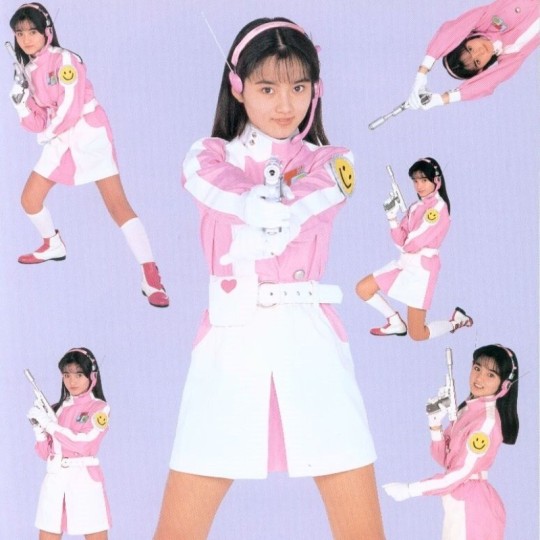
A second movie was released on July 14, 1988, at the start of which Iko bequeaths her Super Incom to a new girl, coincidentally named Iko Sugekawa, who also goes on to work for the LTDT. While the original Iko was played by Akiko Isozaki, a relatively obscure child actress, the new Iko was played by Mia Masuda, a popular idol who was just getting her start around this time. This meant many Iko-chan fans were also Mia Masuda fans, and vice versa. Even now many people seem to know of the series predominantly through her involvement. This movie gives Iko a new (and more iconic) outfit, plus a spectacularly intelligent and accomplished rival named Runna Hakuba. Mia Masuda would stay on as Iko for the third movie, released on June 22, 1990, but each subsequent production would cast a different actress in the role. As for the series director, Minoru Kawasaki is known for producing tokusatsu parodies on the cheap, with Terrestrial Defense Girl Iko being one such example.

Due to the success of the original movie trilogy, a video game based on the series was released for the PC98 engine on December 4, 1992. Titled Chikyuu Bouei Shoujo Iko-chan ~UFO Daisakusen~ (Terrestrial Defense Girl Iko ~The Great UFO Strategy~, this is a turn-based battle game with visual novel elements, in which the LTDT face off against various aliens. Unfortunately, the game didn't sell well. It's speculated that the gameplay style didn't capture the appeal of the title's tokusatsu origins. The in-game art is very pretty though, for whatever that's worth.
Iko would continue starring in live action sequels and spinoffs after that, and a number of companion books were released for the series as well, but the release most relevant to this blog is the Iko-Chan manga.
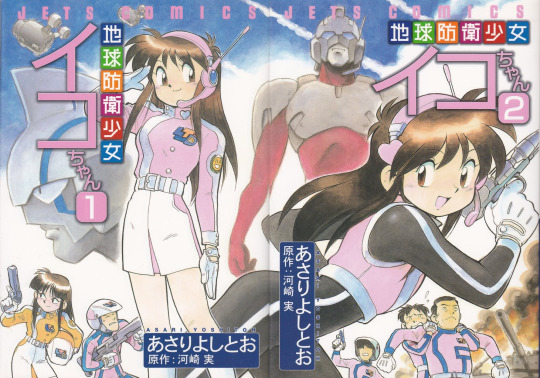
Running in monthly Comic Comp from the May 1988 issue to the May 1991 issue, this manga was created by Yoshito Asari, with writing input from Minoru Kawasaki, the original director. Asari is best known for his involvement in the production of the original Evangelion anime, for which he was an assistant character designer, and he penned a 4koma spinoff titled Evangelion Yonkoma Zenshuu. However, he is an accomplished mangaka in his own right, creating works such as Wahhaman, Manga Science, and Space Family Carlvinson, the lattermost of which would get an OVA adaptation in 1988.
Over the course of its' run, the Iko-chan manga would amass a total of 32 chapters. The first tankobon volume, containing chapters 1 through 18, was published by Kadokawa on September 13, 1990, but the remainder of the series would not be compiled until a new edition of both volumes was released by Hakusensha under their Jets Comics label on December 25, 1999. A digital rerelease, also by Hakusensha, was made available on December 26, 2014.
This manga makes some changes to the original plot, particularly in Iko's backstory. In this version, Iko already works for the LTDT part-time at the start of the series, and she gets the Super Incom after helping Miracleman while he's drunk. It's less momentous, but I actually prefer it given how poorly the original Iko's buddying up to cops has aged. The way the Super Incom works is slightly different too: it activates when she says please, enunciating each syllable (o-ne-ga-i). This makes whatever she thinks will help happen, but if she attempts to use this power for selfish reasons, the device will malfunction.
Unfortunately, I wasn't able to read very much of the manga, and the language barrier made it difficult to get into any version of this series. Huge shout-out to the surprisingly detailed Japanese Wikipedia page, which was a tremendous help in researching for this overview. They also have quite a bit of information on later installments in this series I glossed over. There is a lot more I could get into, but I wanted to mainly focus on the meat of the franchise, and this post is long enough as is.
I really hope fan translations of the series become available one day, because Terrestrial Defense Girl Iko seems like a lot of fun, and I would definitely recommend it to fans of older tokusatsu. There are elements of it I don't vibe with, but still, it has an interesting premise, some decently entertaining humor, a super catchy theme song, and a killer aesthetic.
#my posts#long post#Chikyuu Bouei Shoujo Iko-chan#Terrestrial Defense Girl Iko#Earth Defense Girl Iko-chan#地球防衛少女イコちゃん#Minoru Kawasaki#河崎実#Yoshito Asari#Yoshitoh Asari#Yoshitoo Asari#あさりよしとお#Monthly Comic Comp#shounen#80s#live action#video game
17 notes
·
View notes
Text
WALK CHEERFULLY:
Gangster falls in love
Goes straight for secretary
Can’t hide from his past
youtube
#walk cheerfully#random richards#poem#haiku#poetry#haiku poem#poets on tumblr#haiku poetry#haiku form#poetic#hogaraka ni ayume#criterion channel#criterion collection#silent film#gangster movies#romance#yasujiro ozu#hiroshi shimizu#tadao ikeda#minoru takada#hiroko Kawasaki#satoko date#takeshi sakamoto#nobuko matsuzono#hisao yoshitani#Youtube
0 notes
Text







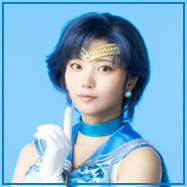













Sailor Moon Musical - Nogizaka46 5th Generation Version 2024
Cast reveal
Team Moon (from Nogizaka46)
Nagi Inoue as Sailor Moon / Usagi Tsukino
Aya Ogawa as Sailor Mercury / Ami Mizuno
Hina Okamoto as Sailor Mars / Rei Hino
Mao Ioki as Sailor Jupiter / Makoto Kino
Teresa Ikeda as Sailor Venus / Minako Aino
Team Star (from Nogizaka46)
Satsuki Sugawara as Sailor Moon / Usagi Tsukino
Aruno Nakanishi Sailor Mercury / Ami Mizuno
Miku Ichinose as Sailor Mars / Rei Hino
Nao Tomisato as Sailor Jupiter / Makoto Kino
Sakura Kawasaki as Sailor Venus / Minako Aino
General Cast
Yuzuha Uesegi as Naru Osaka
Miyu Nakano as Gurio Umeno
Tenju Mitsuki as Tuxedo Mask / Mamoru Chiba
Tsukasa Hiryu as Kunzite
Aya Akane as Zoicite
Makise Rui as Nephrite
Mayuko Ohara as Jadeite
Rinko Matsubara as Queen Beryl
Iroha Okuda as Queen Serenity (appears in projection) from N46
Misato Matsumoto and Hiroko Wakasa return as Luna's puppet operators
Ensemble: Misaki Aoki, Yazawa Asuka, Amane, Haruka Ikeda, Misakura Ikeda, Ito Wako, Nanaka Suzuki, Mina Minoru Suzuki, Akari Matsushima, Ayano Watanabe
The musical will be playing in Tokyo from April 12 to 29, 2024!
#sailor moon#sera myu#nogimyu 2024#nogimyu#inner senshi#nogimyu cast#dark kingdom#tuxedo mask#queen beryl#queen serenity#shitennou#naru#nogimyu team moon 2024#nogimyu team star 2024#umino#kunzite#sailor mercury#sailor mars#sailor jupiter#sailor venus#zoicite#nephrite#jadeite#bssm#pardon me if the names are wrong... using a translator as usual
69 notes
·
View notes
Text




Miracle Bunny 1 (1988)
Heroine tokusatsu film directed by Minoru Kawasaki, starring Kuroki Eiko.
Sequel is Miracle Bunny 2.
English subtitled version by Gossameru Fansubs over on archive.org.
35 notes
·
View notes
Photo










Minoru Onoda
Edited by Anne Mosseri-Marlio. With essays by Edward M. Gómez, Astrid Handa-Gagnard, Shoichi Hirai, Koichi Kawasaki, and Takesada Matsutani
Scheidegger & Spiess, Zürich 2018, 232 pages, 176 color and 7 b/w illustrations, 24 x 30 cm, ISBN 978-3-85881-821-8
euro 68,00
email if you want to buy [email protected]
First-ever monograph on Japanese artist Minoru Onoda, a distinguished member of the radical Gutai artistic movement in the 1960s and 1970s
Minoru Onoda is best known as a member of Gutai, Japan’s first postwar radical artistic movement, which challenged what it saw as the rigid, reactionary ideologies of the art of the time and initiated new ones that redefined the relationships among matter, time, and space. Concurrently to the inception of Gutai, Onoda became enchanted by concepts of repetition, producing paintings and drawings with amalgamations of gradually increasing dots and organically growing shapes. But less is known in the West about Onoda’s early and late-career work.
At long last, this first-ever full monograph on Minoru Onoda introduces him as an artist in his own right. Apart from his role with Gutai, the book mines Onoda’s sketchbooks and completed works to explore his creative process over time, from his artistic education in the late 1950s at the Osaka Institute of Fine Arts and the Osaka School of Art to his later works following the 1972 disbanding of Gutai, which see the artist moving toward a monochrome and more conceptual style.
30/03/23
orders to: [email protected]
ordini a: [email protected]
twitter: @fashionbooksmi
instagram: fashionbooksmilano, designbooksmilano tumblr: fashionbooksmilano, designbooksmilano
7 notes
·
View notes
Text
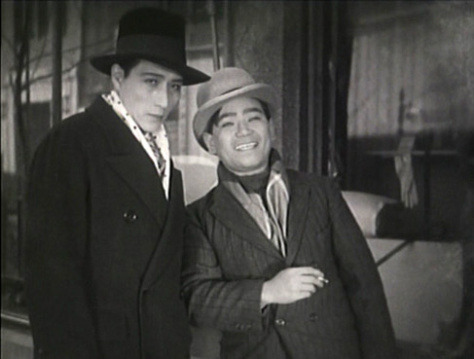
Minoru Takada and Hisao Yoshitani in Walk Cheerfully (Yasujiro Ozu, 1930)
Cast: Minoru Takada, Hiroko Kawasaki, Hisao Yoshitani, Satoko Date, Takeshi Sakamoto, Teruo Mori, Nobuko Matsuzono, Utako Suzuki. Screenplay: Tadao Ikeda, based on a story by Hiroshi Shimizu. Cinematography: Hideo Shigehara. Set decoration: Hiroshi Mizutani.
The English titles of Yasujiro Ozu's films are typically oblique, ranging from the atmospheric but uninformative -- Late Spring (1949), Early Summer (1951) -- to the proverbial or epigrammatic (but only in Japanese) -- The Flavor of Green Tea Over Rice (1952), A Hen in the Wind (1958) -- to the simply mistranslated -- Record of a Tenement Gentleman (1947). The title of Walk Cheerfully would seem to be similarly somewhat aside of the mark for what started as a gangster movie, but at least the phrase appears in an intertitle in the film as the parting advice given by Yasue to Kenji as he's being taken away by the police -- she seems to mean it somewhat in the spirit of "take care." The film itself is a curious blend of gangster film and romance. In fact, the work it reminded me of sometimes was Frank Loesser's musical Guys and Dolls, which has a similar theme of a shady guy being redeemed by a good girl. The analogy leaped to mind when some of Ozu's gangsters did synchronized routines and gag soft-shoe dances in the pool hall where they meet. For these are not hard-core American gangsters or even murderous yakuza; they're small-time pickpockets and thieves. We meet our hero, Kenji (Minoru Takada), while he's still a thug known as "Ken the Knife" for the tattoo on his left forearm. The movie begins with a chase: Kenji's sidekick, Senko (Hisao Yoshitani), being pursued by a mob who think he has stolen a man's wallet. When the mob catches up with Senko, Kenji appears out of the crowd and suggests that they search him for the wallet. Nothing turns up, so Senko goes free, but later we see them meet up and discover that they're in cahoots: Kenji has picked the wallet from Senko as the mob was roughing him up. Eventually, however, both Kenji and Senko try to go straight when Kenji meets and falls in love with Yasue (Hiroko Kawasaki). When they first see her, they think Yasue is a rich woman: She arrives at a jewelry store in a large car and goes in to buy a diamond ring. But it turns out that she's running an errand for her boss (Takeshi Sakamoto), the head of the Ono Trading Co., who puts the moves on her when she brings it to him. Eventually, after Kenji and Yasue meet up again and he learns the truth, that she's just an office worker, he will have an opportunity to beat up Ono for sexually harassing Yasue. This is very minor Ozu, but he handles it well, demonstrating not only his skill at telling a story but also the way American movies influenced him: On the wall at Ono Trading Co. there's a poster for Joan Crawford's Our Dancing Daughters (Harry Beaumont, 1928). Movies, big cars, and pop music -- Senko has written the English lyrics to the 1928 song "The Gay Caballero" on the wall of the room he shares with Kenji and is trying to learn them -- figure large with these very modern Japanese gangsters.
2 notes
·
View notes
Text









Eguchi Hisashi no Nantoka Narudesho! by Osamu Nabeshima and Minoru Kawasaki, 1990
0 notes
Text



‘Executive Koala’ (2005). Directed by Minoru Kawasaki.
21 notes
·
View notes
Text



Nakano Broadway with myself and kaiju eiga director Minoru Kawasaki (feat. Matt Frank)
Photos by Alan Breckenhoff
14 notes
·
View notes
Link
According to SciFi Japan, the director of Monster X Strikes Back, Daikaiju Mono and Earth Defense Widow, Minoru Kawasaki, is working on a new kaiju movie called Monster Seafood Wars (三大怪獣グルメ Three Gourmet Monsters), that for now reminds a lot of Space Amoeba. We’ll see.
#monster seafood wars#minoru kawasaki#kaiju#tokusatsu#monster x strikes back#daikaiju mono#earth defense widow
5 notes
·
View notes
Link
When Toku first launched in 2017, it seemed like a cruel joke: an obscure cable channel broadcasting Ultraman shows never before available in English. Each new season they acquired was accompanied by a triumphant press release... and each failed to turn up anywhere online. But 2018 brought the launch of a Toku streaming service, along with the acquisition of several older Ultra Series that Crunchyroll lost the rights to. I signed up in October during their $1.99-a-month-for-9-months sale, and promptly discovered a tokusatsu film they hadn't announced: Minoru Kawasaki's Outerman (2015).
Outerman passed the English-speaking tokusatsu fandom by; you'll be hard-pressed to find anyone who talked about it besides the omnipotent Kevin Derendorf. Given Kawasaki's previous works in the genre and its lack of subtitles until now, this is not terribly surprising. Here's the real surprise: Outerman is pretty much a note-perfect Ultraman parody, overcoming its microscopic budget with a clever premise that never loses steam.
40 notes
·
View notes
Photo

Monster X Strikes Back: Attack the G8 Summit (2008)
20 notes
·
View notes
Text




Miracle Bunny 2 (1988)
Heroine tokusatsu film directed by Minoru Kawasaki, starring Kuroki Eiko.
First part is Miracle Bunny 1.
English subtitled version by Gossameru Fansubs over on archive.org
9 notes
·
View notes
Photo
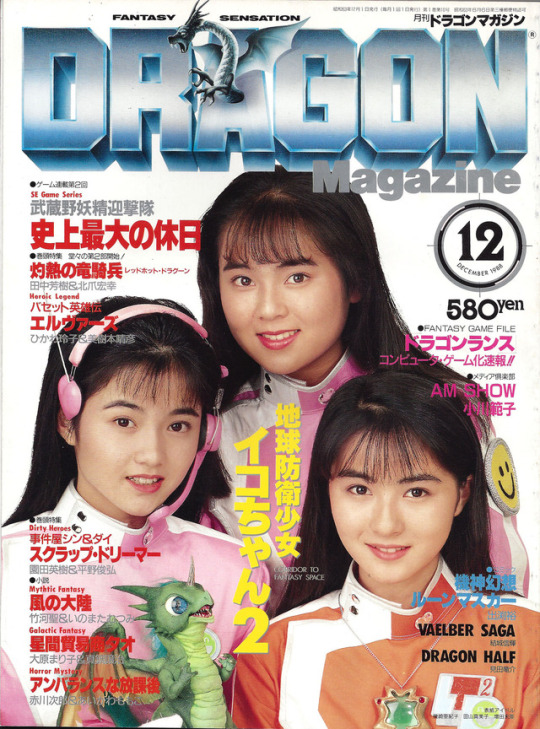
The December 1988 issue of Dragon Magazine featured a story on Earth Defense Girl Iko-chan ( 地球防衛少女イコちゃん), a sorta Ultraman/tokusatsu parody series from Minoru Kawasaki.
Kawasaki also directed The Calamari Wrestler, one of the best films of all time.
337 notes
·
View notes